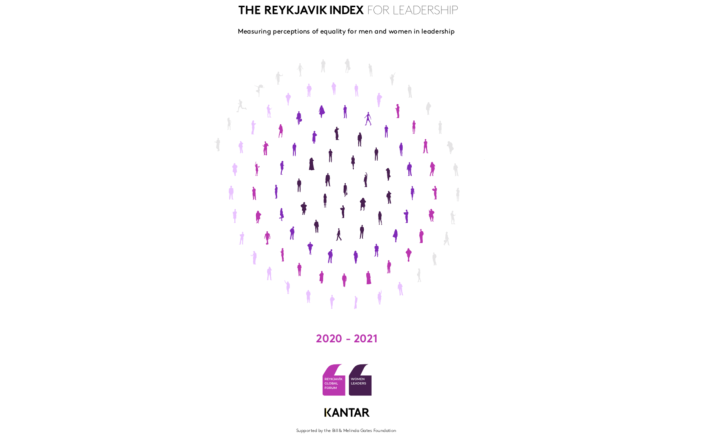The Reykjavik Index for Leadership 2020/2021
Source: Kantar
Women Political Leaders and Kantar came together in 2018 to create the Reykjavík Index for Leadership– the first measure of perceptions of women and men in terms of their suitability for leadership. The initial findings revealed significant, complex, and deep-seated prejudice towards women – where women were not seen as equally suitable to lead.
When the Reykjavík Index was launched, we acknowledged that progress in equality for women was far from guaranteed. Across the G7 group of countries, and in multiple areas of economic activity, many of the 2018 Index scores fell short of the target score of 100, which indicates a consensus across society that women and men are equally suited for leadership. Nevertheless, we fully hoped at that time to witness improvements in perceptions in the years to come, with scores of countries and sectors approaching the target score of 100.
Unfortunately, in 2020, the third year of Index results, we can only note a striking absence of progress. Indeed, this year cannot be called a period of advancement.
The Reykjavík Index for Leadership 2020-2021 presents findings drawn from the attitudes of over 20,000 people across ten countries – the G7 nations (comprising Canada, France, Germany, Italy, Japan, the United Kingdom, and the United States) along with India, Kenya, and Nigeria. We believe that the addition of new countries to the G7 nations will allow us to better observe whether progress is being made, where stereotypes endure, and where public policy or private sector intervention is making a difference.
A look at the average score for the G7 countries, which we can now track across three years, shows very little change: it remains a 73. This can be regarded as the gap between the ‘birthright’ of equality for men, and the everyday reality of women’s experiences with inequality across the world.
Click here to see the report.

Women Political Leaders and Kantar came together in 2018 to create the Reykjavík Index for Leadership– the first measure of perceptions of women and men in terms of their suitability for leadership. The initial findings revealed significant, complex, and deep-seated prejudice towards women – where women were not seen as equally suitable to lead.
When the Reykjavík Index was launched, we acknowledged that progress in equality for women was far from guaranteed. Across the G7 group of countries, and in multiple areas of economic activity, many of the 2018 Index scores fell short of the target score of 100, which indicates a consensus across society that women and men are equally suited for leadership. Nevertheless, we fully hoped at that time to witness improvements in perceptions in the years to come, with scores of countries and sectors approaching the target score of 100.
Unfortunately, in 2020, the third year of Index results, we can only note a striking absence of progress. Indeed, this year cannot be called a period of advancement.
The Reykjavík Index for Leadership 2020-2021 presents findings drawn from the attitudes of over 20,000 people across ten countries – the G7 nations (comprising Canada, France, Germany, Italy, Japan, the United Kingdom, and the United States) along with India, Kenya, and Nigeria. We believe that the addition of new countries to the G7 nations will allow us to better observe whether progress is being made, where stereotypes endure, and where public policy or private sector intervention is making a difference.
A look at the average score for the G7 countries, which we can now track across three years, shows very little change: it remains a 73. This can be regarded as the gap between the ‘birthright’ of equality for men, and the everyday reality of women’s experiences with inequality across the world.
Click here to see the report.